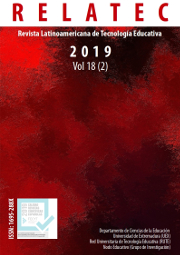The maker culture in the dynamics of construction collaborative of online gamers. Case study Gumiparty
DOI:
https://doi.org/10.17398/1695-288X.18.2.171Keywords:
Maker Movement, Case Study, Learning by Discovery, VideogameAbstract
In the context of the Research Project «Learning ecologies in multiple contexts: analysis of expanded education projects and conformation of citizenship (EDU2014- 51961-P)» from «Nodo Educativo» Research Group, a case study is presented which aims to highlight which are the learning strategies of social component in creation spaces similar to the maker culture from the use of online videogames. For this, a qualitative study was designed and the case study method was selected. We selected 21 participants of the Gumiparty event. The oral interview was used as a technique for collecting information. The analysis of the data was done through the constant comparison method and for this we used the software NVivo version 11. We analyzed categories related to the possibilities of creation and social transformation of the maker movement and applied to the community of gamers of the event. It was observed how the gamers create a dynamic community that supports the individual learning of its members and converts them into prosumers of content related to videogames. It is concluded that the maker culture offers an educational model with a series of practices that can be taken to the conventional classroom for the development of connected and deep learning.
Downloads
References
Ceccaroni, L. y Piera, J. (2017). Analyzing the role of citizen science in modern research. Hershey: Information Science Reference.
Dougherty, D. (2016). Free to make: how the maker movement is changing our schools, our jobs, and our minds. Recuperado a partir de http://samples.overdrive.com/?crid=777c2933-2eb7-49f1-a61f-ee75cb0c4e7b&.epub-sample.overdrive.com
Glaser B. (1992) Basics of Grounded Theory Analysis. Mill Valley: Sociology Press.
Glaser, B. y Strauss, A. (1967). The discovery of grounded theory: strategies for qualitative research. New York: Aldine Publishing Company
Guerra, J. & Revuelta, F. I. (2015). Videojuegos precursores de emociones positivas: propuesta metodológica con Minecraft en el aula hospitalaria. IJERI: International Journal of Educational Research and Innovation, (3), 105-120.
Hagel, J., Brown, J., y Davison, L. (2010). From Do It Yourself to Do It Together. Recuperado a partir de https://hbr.org/2010/02/from-do-it-yourself-to-do-it-t.html
Hatch, M. (2014). The maker movement manifesto: rules for innovation in the new world of
crafters, hackers, and tinkerers. New York: McGraw-Hill Education.
Martínez, M. (2016). ¿Por qué tienen tanta aceptación los espacios Maker entre los jóvenes? Cuadernos de Investigación En Juventud, 1(1). https://doi.org/10.22400/cij.1.e003
Martinez, S. y Stager, G. (2013). Invent to learn: Making, tinkering, and engineering in the classroom. Torrance: Constructing Modern Knowledge Press.
Merriam, S. (1988). Case study research in education: a qualitative approach (1st ed.). San Francisco: Jossey-Bass.
Niemeyer, D., y Gerber, H. (2015). Maker culture and Minecraft: implications for the
future of learning. Educational Media International, 52(3), 216-226. https://doi.org/10.1080/09523987.2015.1075103
Nieto, M. (2016). La nueva tendencia tecnológica se llama “movimiento maker.” El país. Recuperado a partir de http://tecnologia.elpais.com/tecnologia/2016/09/22/actualidad/1474560262_851948.html
Polaino-Lorente, A. (2011). La cultura del instante. Revista Abril, 116. Recuperado a partir de http://www.arbil.org/116inst.htm
Revuelta, F. I., & Guerra, J. (2012). ¿Qué aprendo con videojuegos? Una perspectiva de meta-aprendizaje del videojugador. Revista de Educación a Distancia (RED), 33.
Rifkin, J. (2011). La tercera revolución industrial. Barcelona: Paidós.
Simons, H. (2011). Estudio de caso: teoría y práctica. Madrid: Morata.
Strauss, A. y Corbin, J. (2002). Bases de la investigación cualitativa. Técnicas y procedimientos para desarrollar la teoría fundamentada. Colombia: Universidad de Antioquia.
Tessler, C., Givony, S., Zahavy, T., Mankowitz, D. y Mannor, S. (2017). A Deep Hierarchical Approach to Lifelong Learning in Minecraft. Proceedings of the Thirty-First AAAI Conference on Artificial Intelligence (AAAI-17). Recuperado a partir de https://aaai.org/ocs/index.php/AAAI/AAAI17/paper/download/14630/13950
Toffler, A. (1986). La tercera ola. Barcelona: Orbis.
Zavalloni, G. (2011). La pedagogía del caracol: por una escuela lenta y no violenta. Barcelona: Graó
Downloads
Published
Issue
Section
License
Authors who publish in this journal accept the following conditions:
1. The Author retains copyright in the article. Upon acceptance of the article, the author shall grant to the Publisher the right of first publication of the article. with the dcoument registered with the Creative Commons Attribution-NonCommercial-NoDerivative 4.0 International (CC BY-NC-ND) license, which allows to third parties to use what is published whenever they mention the authorship of the work and the first publication in this journal.
2. Authors can make other independent and additional contractual agreements for the non-exclusive distribution of the article published in this journal (eg, include it in an institutional repository or publish it in a book) provided they clearly indicate that the work was published for the first time in this journal.
3. Authors are allowed and recommended to publish their work on the Internet (for example on institutional or personal pages) before and during the review and publication process, as it can lead to productive exchanges and a greater and faster diffusion of published work (see The Effect of Open Access).









